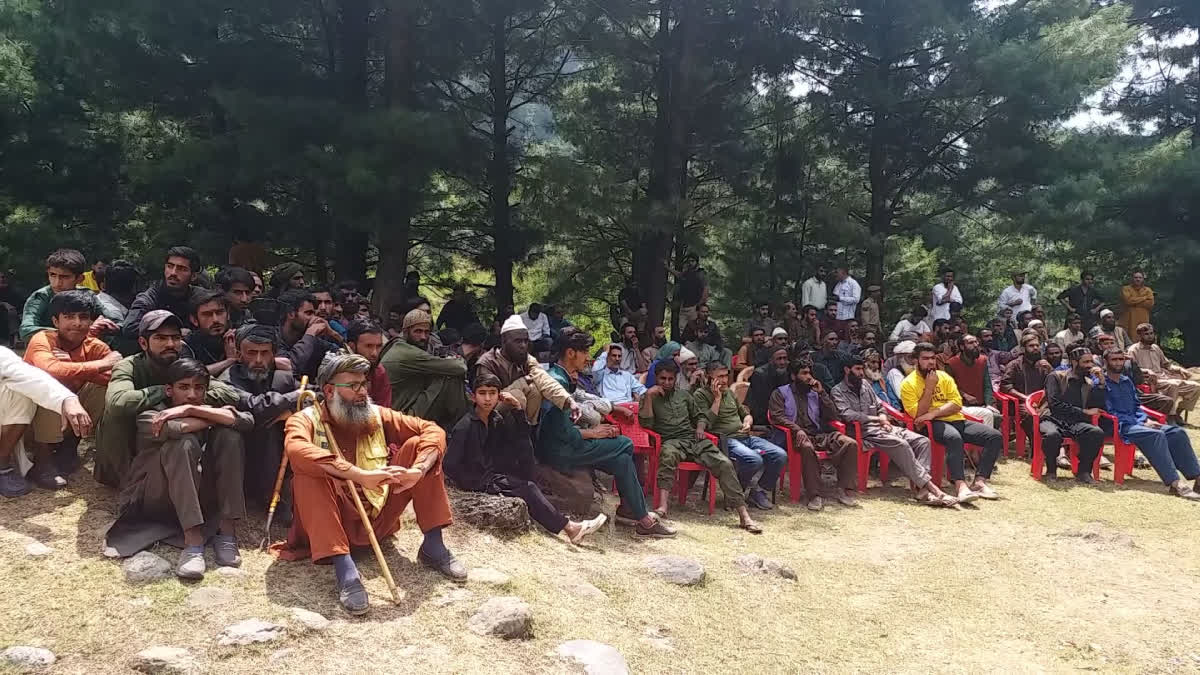Srinagar:The implementation of the Forest Rights Act (FRA), which recognises tribal rights over forests, was the only act that was celebrated by the tribal population of Jammu and Kashmir after the abrogation of Article 370 and 35 A. Enacted in 2006 by the Congress-led government in Centre, the Act was implemented in Jammu and Kashmir 14 years later in 2020, a year after the abrogation of Article 370 and division of the erstwhile state into two union territories.
The FRA brought cheers among tribals like Abdul Rashid Jagad, a 50-year-old Gujjar from Hanjan, a small village of the Tral forest belt inhabited by 300 Gujjar families in the Pulwama district. "Forest employees do not allow us to graze our cattle and collect firewood or forest produce," Jagad told ETV Bharat.
"Fencing of forests has hampered grazing and our movement," he said, adding that FRA will ease these restrictions. The act grants rights for dwelling, collection of forest produce, demarcating routes of grazing, construction and of community dhoks (temporary huts) for seasonal migration of tribals and dwellers after they apply through a procedure laid down in the Act.
The FRA grants two kinds of ownerships-community and individual-to-tribals and forest dwellers and its implementation is done at the grassroots level. As per the Act, Gram Sabhas pass a resolution to declare a land as forest and then the claims are filed by written applications. The Sabha is presided over by the chairman and is attended by members of the community, Forester, Patwari and panchayat secretary.
"Gram Sabha chairpersons have to sign the resolution but they do not sign as they are in nexus with the administration," Mustafa Rahi, District Development Councilmember from Kalaroos in Kupwara district, told ETV Bharat. "When they do not sign, it means the gram sabha was not held," he added. The claims are then viewed by the block, sub-divisional and district-level committees to check the applications for correction.
But the ownership is not so easy to come as was anticipated by tribals like Jagad, who says it takes months for a claim to settle before it is accepted or rejected by the government. The disbelief among tribals stems from the allegations that the Jammu and Kashmir administration has been "wilfully neglecting" claims of the tribals or forest dwellers.
Zahid Parwaz Choudhary, a young Gujjar activist, said the FRA is the "best act" in the Constitution of India but it is "disrespected" by the Jammu and Kashmir government. Choudhary, who is mobilising and educating Gujjars for the FRA, said the Act grants rights to not only the tribals but also the non-tribals like Dogras in Jammu and Kashmir in Tosamaidan area of Budgam district or Kangan area in Ganderbal district.
Choudhary said that they held GramSabhas in 30 villages. From Tral in Pulwama district, Shopian, Kupwara to Kangan in Ganderbal district where they passed resolutions, filed claims, but these claims did not move beyond BDO offices. "As many as 3,000 claims have been filed by the Gujjar community across Kashmir but none has been accepted yet by the forest department," he said.
However, the government data reveals that genuine claims have been settled and land titles have been issued as per individuals and community rights. Dr Sheikh Ghulam Rasool, activist and consultant for tribals on FRA, accused the forest department and its employees of being "the main and major hurdle" in its implementation. "The forest officials mislead and misinform people about the act," he told ETV Bharat.
Fayaz Karnahi, another tribal activist, said the tribals need a lot of consultation, workshops, and hand-holding about the Act. Communist legislator Yousuf Tarigami told ETV Bharat that FRA implementation is one of the biggest issues at the national as well as the Jammu and Kashmir level. "FRA implementation needs a sustained movement across the country and in Jammu and Kashmir for its benefit to reach the tribals and forest dwellers," Tarigami said.
